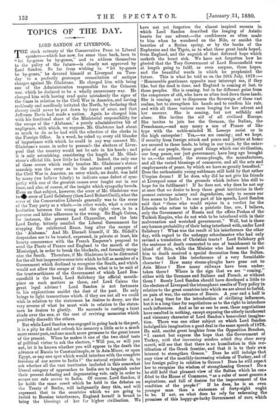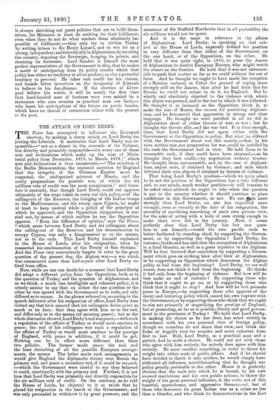TOPICS OF THE DAY.
LORD BANDON AT LIVERPOOL.
THE stock entreaty of the Conservative Press to Liberal speakers—which has now, for some time back, been to "let by-gones be by-gones," and to address themselves to the policy of the future—is clearly not approved by Lord Sandon. So far from wishing to "let by-gones be by-gones," he devoted himself at Liverpool on 'Tues- day to a perfectly grotesque resuscitation of antique charges against Mr. Gladstone. He charged him with being one of the Administration responsible for the Crimean war, which he declared to be a wholly unnecessary war. He charged him with having read quite mistakenly the signs of the times in relation to the Civil War in America, and having recklessly and needlessly irritated the North, by declaring that slavery could never be put down by force of arms, and that Jefferson Davis had made a nation. Again, he charged him with his fractional share of the Ministerial responsibility for the escape of the 'Alabama,' a purely administrative bit of negligence, with which, we suppose, Mr. Gladstone had about as much to do as he had with the selection of the clerks in the Foreign Office. In a word, he raked up every old blunder of importance with which he could in any way connect Mr. Gladstone's name, in order to persuade the electors of Liver- pool that the country would not be safe in his hands ; and it is only astonishing, considering the length of Mr. Glad- stone's official life, how little he found. Indeed, the only one of these errors which really touches Mr. Gladstone's states- manship was the error as to the nature and prospects of the Civil War in America, an error which, no doubt, was held by many (we believe falsely) to indicate some defect of sym- pathy with one of the greatest causes ever fought out in our time, and also, of course, of the insight which sympathy breeds. Even on that subject, however, the error of Mr. Gladstone was to. error of Lord Salisbury (then Lord Robert Cecil), what the error of the Conservative Liberals generally was to the error of the Tory party as a whole,—in other words, what a certain hesitation between the wrong and the right view, is to a perverse and bitter adherence to the wrong. Sir Hugh Cairns, for instance, the present Lord Chancellor, and the late Lord Derby, bitterly assailed the Liberal Government for stopping the celebrated Rams, long after the escape of the Alabama.' And Mr. Disraeli himself, if Mr. Slidell's despatches are to be trusted, expressed, in private at least, his hearty concurrence with the French Emperor's proposal to send the Fleets of France and England to the mouth of the Mississippi, in order to break the blockade, and formally recog- nise the South. Therefore, if Mr. Gladstone is to be distrusted for the all but inoperative error into which he fell as member of a Government which declined to recognise the South, and which would not allow the escape of the Rams, what is to be said of the trustworthiness of the Government of which Lord Bea- consfield is the head, Lord Salisbury the official mouth- piece on such matters as these, and Lord Cairns the great legal adviser ? Lord Sandon is not fortunate in his explorations amidst the dust of the past. He only brings to light transactions which, if they are not all we could wish in relation to the statesman he desires to decry, are the very reverse of what he must wish in relation to the states- men he desires to glorify. He succeeds in casting a faint shade over the one, at the cost of reviving memories which positively discredit the others.
But while Lord Sandon was engaged in going back to the past, it is a pity he did not refresh his memory a little as to a much more recent past, and one much more germane to the great issues of the present. When he makes it one of the two chief tests of political virtue to ask the electors, "Will you, or will you not, let it be known whether you will oppose to the death the advance of Russia to Constantinople, or in Asia Minor, or upon Egypt, or any one spot which would interfere with the complete freedom of our access to India V" the natural rejoinder is, to ask whether all the vast territories included in this somewhat liberal category of approaches to India are to languish under their present debasing and degenerating rule, only in order to secure our safe access to India. Of course, Lord Sandon, if he holds the same creed which he held in the debates on the Treaty of Berlin, will indignantly deny this, and will represent that to the countries which we are going to forbid to Russian interference, England herself is bound to bring the blessings of her far higher civilisation. We have not yet forgotten the almost inspired accents in which Lord Bandon described the longing of Asiatic. hearts for our advent,—the confidences so often made to him when he wandered on the Nile, or amidst the beauties of a Syrian spring, or by the banks of the Euphrates and the Tigris, as to what these great lands hoped, from England, and the anguish of that deferred hope which maketh the heart sick. We have not forgotten how he gloried that the Tory Government of Lord Beaconsfield was at length going to fulfil, or even surpass, these hopes, and the beautiful words in which he prophesied the' future. This is what he told us on the 30th July, 1878 :— "Honourable gentlemen opposite may interrupt me, if they like, but the deed is done, and England is coming at last, to- those peoples. She is coming, but in far different guise from the conquerors of old, who have so often trod down these lands. She is coming, not to dispossess the Sovereign of these vast realms, but to strengthen his hands and to confirm his rule, and with all those various races longing for her advent and her succour. She is coming, but not selfishly and alone. She invites the aid of all civilised Europe. She invites to join her the German, the Italian, the Frenchman,—and may many a son of France of like. type with the noble-minded M. Lesseps assist us in: the high enterprise ! Yes,—we are coming ; and we hope, if security from foreign attack and peace and justice at home. are secured to those lands, to bring in our train, by the enter- prise of our people, those good things which our civilisation, our long peace, our just government, have long ago brought to us.—the railroad, the steam-plough, the manufactures, and all the varied blessings of commerce, and all the arts and. employments of peace, by which we have so greatly benefited." Does the enthusiastic young nobleman still hold by that rather- Utopian dream? If he does, why did he not give his friends at Liverpool some of the grounds which induce him still to hope for its fulfilment ? If he does not, why does he not say at once that we desire to keep these great territories in their present extreme misery and degradation, only to secure our free access to India ? In one part of his speech, Lord Bandon. said that "those who would rejoice in a verdict for the Liberals who refuse to take a patriotic line, are, I believe, only the Government of Russia and the effete Pashas of the Turkish Empire, who do not wish to be interfered with in their malversation and wretched government." Well, but is there- any human probability of their being interfered with, under Lord Salisbury ? What was the result of his interference the other day, with regard to the unhappy schoolmaster who had only revised a translation of Christian tracts? Lord Salisbury got the sentence of death commuted to one of banishment to the' island of Solo, while the Minister who had meant to put him to death received a special decoration from the Sultan. Does that look like interference of a very formidable. character ? How many steam-ploughs have gone out te Asia Minor ? How many railways have been under- taken there? Where is the sign that we are "coming," either with the Germans and Italians and French, or without them Surely Lord Bandon should have developed a little to the electors of Liverpool the triumphant results of Tory policy in/ relation to the great countries into which we are about to forbid, on pain of war, the entrance of Russia. A year and a half is not a long time for the introduction of civilising influences,. but it is a long time for negotiations as to the right to introduce such influences. And as far as can be seen, these negotiations have resulted in nothing, except exposing the utterly incoherent and visionary character of Lord Sandon's benevolent imagina- tion. There was one other subject on which Lord Bandon indulged his imagination a good deal in the same speech of 1878.. He said, amidst great laughter from the Opposition Benches, "I cannot but express the hope that the Government of Turkey, with that increasing wisdom which they show every month, will see that that there is no humiliation in this rec- tification of the Greek frontier, and that it is to their own interest to strengthen Greece." Does he still indulge that rosy view of the monthly-increasing wisdom of Turkey, and of her foreign policy in relation to Greece? Does he still expect her to recognise the wisdom of strengthening Greece? Do < 0. he still hold that pleasant view of the Sultan which he cot. fided to the House of Commons, "as a ruler of most generot aspirations, and full of desires for the improvement of the condition of the people I" If he does, he is an even younger man than a statesman of forty-eight ought to be. If not, on what does he rely for redeeming the promises of this happy-go-lucky Government of ours, which is always sketching out great policies that are to fulfil them- selves, for Ministers at least do nothing for their fulfilment, even when they do not do what renders them absolutely im- possible of fulfilment ;—they only try to civilise Turkey by writing letters to Sir Henry Layard, and to win for us a strong, independent, and friendly ally in Afghanistan, by invading the country, deposing the Sovereign, hanging its priests, and storming its fortresses. Lord Bandon is himself the most perfect representative of the Government in this, that he makes a merit of anticipating from its policy results which that policy has either no tendency at all to produce, or else a powerful tendency to prevent. He takes vast credit for his visions, and founds bitter invectives on the incapacity of Liberals to believe in his day-dreams. If the electors of Liver- pool believe his words, it will be nearly the first time that hard-headed men of business were ever misled by a statesman who uses reveries as practical men use facts,— who bases his anticipations of the future on poetic fancies, which have no thread of connection either with the present or the past.



































 Previous page
Previous page